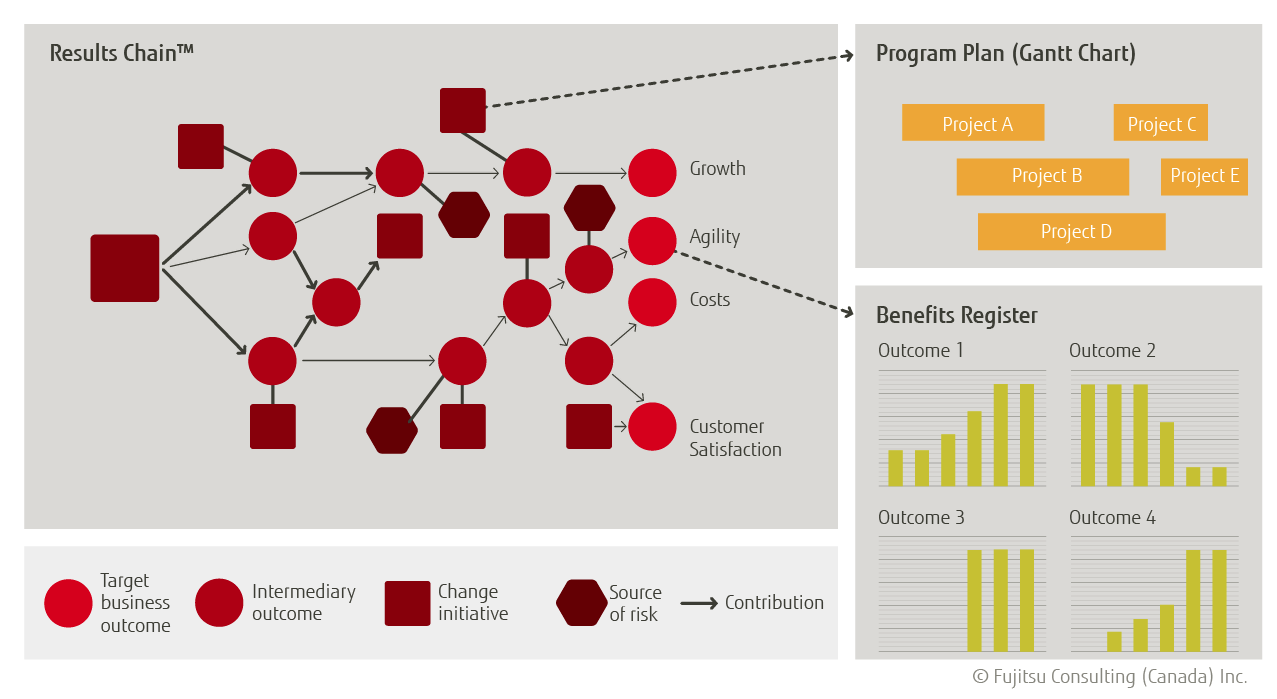 |
Purpose |
||
|
Main Topics
|
Processes
|
Primary Users
|
Secondary Users
|
|
Program Value Case
Program Definition Change Strategy and Plan Program Performance |
Program Management
Portfolio Management |
Business Analysts
Value Analyst Program Manager Business Change Specialist |
Program or Value Management Office
|
|
Typical Applications
|
|||
|
- Introduction of an important change in the organization
- Digital business transformation initiatives - Investment in new business opportunities - Annual budgeting process - Governance of active portfolio of programs |
|||
The Benefits domain includes two interrelated processes: Progam Management and Portfolio Management.

Program Management
The Program Management process assists the organization in planning and realizing the benefits expected from its investments in business solutions and change initiatives. It addresses the key disciplines of benefits identification, and the dynamics of benefits realization, tracking, and recovery.
The organization can leverage powerful business analysis tools such as the Results Chain™ not only to address everything directly related to the dynamics of benefits realization, but also to the proactive management of the organizational change inherent to business transformation initiatives.
 |
For more background on the Benefits Realization approach, download and read The Information Paradox: Realizing the Business Benefits of Information Technology Where Are The Digital Benefits? (Enterprise Executive–2019: Issue 4) |
The proposed processes, techniques and tools help:
- Build a true “value case” for your change program
- Develop and implement a comprehensive benefits management program
- Govern the various projects stemming from the program
- Build and manage the required organizational change initiatives
Change Realization (the people side of change) demands:
- A holistic and proactive approach to implementing new individual and organizational expectations about the future;
- Helping people understand the need for change, motivating them to take action, and maintaining their commitment to shifting long-held behaviors and mind;
- Building individual and organizational resilience;
- Leaving the organization stronger to accommodate future, more frequent and larger changes.
Benefits Realization:
- Targets the delivery of the business benefits sought from a change investment, rather than just tangible deliverables;
- Integrates processes related to benefits management with those of program management, allowing the organization to move beyond traditional investment management logic, which tends to focus on costs and immediate results;
- Ensures that the entire organization, from top executives to project teams, gains a better, shared understanding of the expected benefits of an investment and how to get there;
- Benefits management must continue through the entire life cycle of a change program.
Portfolio Management
The Portfolio Management process helps you govern your enterprise portfolio of programs and make the investment decisions based on their comparative business value, which includes costs, benefits, risk of not realizing those benefits as well as alignment to the business strategies.
Not all investment opportunities are alike. Different types of investments require different decision processes and business rules. Benefits domain proposes a categorization approach with examples of categories and guidelines to help the organization determine their own investment categories for their change programs.
Benefits also proposes a value plot technique to help the organization comparing a set of programs, be they already running or simply a candidate for investment, by providing a multi-dimensional view of their value.
